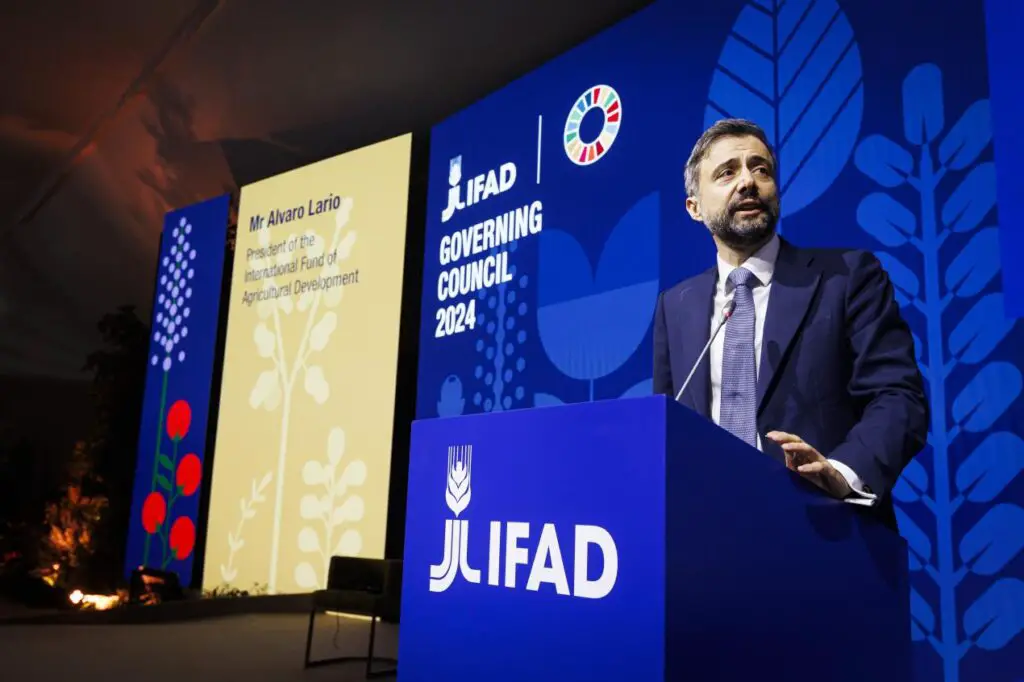- The transformative power of AI-powered innovation in empowering farmers with the tools and knowledge to protect their livelihoods and improve food security.
- Innovative solutions such as AI-powered climate information systems and blockchain technology for digital wallets are improving smallholder farmers’ productivity and driving their resilience.
- UN’s IFAD notes that innovation is not limited to cutting-edge technologies but can also be found in rural communities and among farmers themselves.
In Tanzania, AI-powered innovation is revolutionizing the agricultural industry, showcasing the immense potential of technology to drive resilience and productivity among smallholder farmers.
By leveraging an innovative app that analyzes images of pest-infected crops and provides locally available treatments, farmers have collectively saved an estimated US$100 million in lost crops.
This success story from Tanzania shared with the world during the International Fund for Agricultural Development (IFAD) 47th Governing Council in Rome, Italy, underscores the transformative power of AI-powered innovation in empowering farmers with the tools and knowledge to protect their livelihoods and improve food security.
Impact of AI-powered innovation in agriculture
Across Africa, the positive impact of AI-powered innovation is gathering steam. Bhaskar Chakravorti, also the Dean of Global Business at The Fletcher School, Tufts University, revealed that AI-powered innovation in Tanzania alone yielded savings of US$25 billion.
“When one thinks about investment, the amount of investment is relatively low but the return is enormous and the actions that need to be taken are straightforward,” Bhaskar Chakravorti said.
Bhaskar was speaking during the IFAD’s 47th Governing Council. His highlights brought to the fore the significant economic benefits that AI can bring to the agricultural sector, one of the biggest contributors of GDP in Africa, especially in regions where smallholder farmers are most vulnerable to the impacts of climate change and economic volatility.
Read also: Experts unite to transform nutrition in West and Central Africa’s agriculture
Investing in innovation and information
In neighboring Uganda, Elizabeth Nsimadala, President of the Eastern Africa Farmers Federation, emphasized the importance of investment and access to information for small-scale farmers.
Elizabeth, who is a farmer and agripreneur, highlighted the challenges faced by millions of farmers, including the lack of solutions and the dependence on increasingly unpredictable weather patterns.
“We lack solutions,” she said. “The small-scale farmer has to look up to the sky and pray to God it’s going to rain.”
Elizabeth’s remarks underscore the urgent need for AI-powered innovations that can enhance the resilience of smallholder farmers and ensure food security in the face of mounting challenges.
Read also: Agriculture-led recovery propels Kenya’s third-quarter GDP growth to 5.9%
The quiet innovation revolution reshaping agriculture
In the face of rising hunger, economic volatility, growing inequality, and the impacts of climate change, a quiet revolution is underway in agriculture, driven by innovation and determination.
Alvaro Lario, President of the UN’s IFAD, noted the critical role of innovation in reshaping the future of agriculture. For smallholder farmers, innovation is not just a buzzword; it is a lifeline that offers new ideas, approaches, and opportunities to overcome daily challenges sustainably.
During IFAD’s 47th Governing Council in Rome, the focus on “Innovation for a Food Secure Future” highlighted the needs of smallholder producers in developing countries.
Lario noted that innovation is not limited to cutting-edge technologies but can also be found in rural communities and among farmers themselves.
Overall, the event showcased innovative solutions, including AI-powered climate information systems and blockchain technology for digital wallets, aimed at improving smallholder farmers’ productivity and resilience to shocks.
“Agri-entrepreneurs in developing countries are some of the most innovative and dynamic entrepreneurs in the world. We don’t bring innovations to them – they bring innovations to us,” Lario told heads of state, government leaders, and representatives from IFAD’s 178 Member States.
IFAD’s commitment to innovation
IFAD has been at the forefront of the adoption of AI-powered innovation, using Microsoft AI solutions to develop Omnidata, a centralized analytics platform that addresses small-scale farmers’ needs through targeted investments.
The UN agency is also exploring a collaboration with the Inter-American Development Bank Group (IDB Group) to develop universal digital wallets tailored to the needs of small-scale farmers across the globe. These initiatives demonstrate IFAD’s commitment to driving positive change in rural communities and economies through innovation.
Closing the gender gap
IFAD’s commitment to gender equality and women’s empowerment was also highlighted during the Governing Council. The IFAD Gender Awards recognized successful projects in Bolivia, Cambodia, Ghana, Madagascar, and Montenegro that are driving positive change in rural communities.
Addressing the core causes of gender inequality, including closing the gender gap in farm productivity and agricultural employment, is crucial to reducing hunger and poverty, improving nutrition, livelihoods, and sustainable food systems globally.











